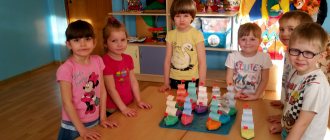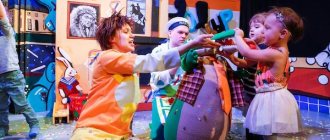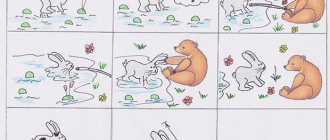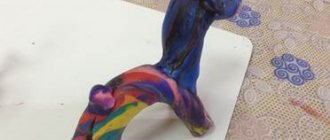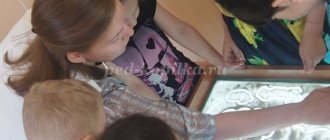Paper construction with children of senior preschool age on the topic “Professions”
Daria Korneva
Paper construction with children of senior preschool age on the topic “Professions”
All professions are important!
Goal: To introduce children to professions , to consolidate the name and concept of professions .
Tasks:
-introduce children to several types of professions
-show the importance of work in a person’s life
- to arouse interest in the work of adults in different professions
-to evoke respect and desire to imitate adults
-develop a kind attitude towards people of different professions
Final event: exhibition of children's works.
TEACHER: Guys, soon you will all go to school, then to college, and then you will find a profession in which you will work.
What does the word “ profession ” mean? (children's answers)
.
Profession is a person’s occupation , his work activity, business, work. There are many professions .
List the professions that you know. (children's answers)
.
Let's look at pictures with professions .
Do you think being a doctor is a good profession ? (children's answers)
Doctors, doctors are different, depending on what they treat. Surgeons perform operations, dentists treat teeth. Oculists are eye specialists, a cardiologist treats the heart, an ENT specialist treats the ears, nose and throat, and a traumatologist treats injuries and fractures.
When you and I see these people, we immediately understand that these are doctors. Why? What do they have in common (children's answers)
That's right, a white robe, a white cap with a red cross.
Now we will warm up. Stand near your chairs and repeat after me.
Physical education minute:
have many professions in the world ! (Hands on the belt - turns the body left and right)
Let's talk about them now: (spread your arms to the sides)
Here is a seamstress sewing a shirt, (Movements imaginary with a needle)
The cook cooks compote for us (“We stir” with a ladle)
The pilot is flying the plane (Hands to the sides)
For landing and for takeoff. (Hands down, hands up)
The doctor gives us injections (fingers crossed)
And there is a security guard at the school. (Arms bent at the elbows, forceful gesture)
A bricklayer lays a brick (We alternately place our hands on top of each other)
And the hunter catches the game (They make binoculars out of their fingers)
There is a teacher, there is a blacksmith (They bend their fingers, listing professions )
Ballerina and singer.
To have a profession , (We extend our fingers)
You need to know a lot, be able to (Turns with hands)
Well study my friend! And of course, don’t be lazy! (Negative movement of the index finger)
There are many different doctors. And each doctor has his own tools. All tools are stored in a suitcase.
You all love to play doctor, but we don’t have a suitcase. Today we will design (make a suitcase)
. And everyone will have their own suitcase.
Equipment: sheet of A4 paper , 2 red rectangles, handle for a suitcase in the shape of a letter (H)
.
Paper construction (suitcase)
:
We bend the A4 sheet into pieces.
We bend the sheet (where it opens)
approximately 2-3 cm.
Glue 2 red rectangles.
Take the handle for the suitcase (letter H)
and glue it on.
Glue the 2 folded ends of the sheet overlapping each other.
These are the suitcases we got.
Goal: To consolidate children’s knowledge about different professions and their meaning. Equipment: envelope, pictures depicting different professions, cards for completing drawings, chips, emblems with a smile for each child. Progress of the lesson Educator: I have an unusual envelope, let's see what's in it? There are a lot of mysteries here. Shall we guess? I fuss with the kids, I spend all my days with them, I go for walks with them. I put them to bed, and, of course, I love them
I am my profession. (Teacher) Shovels the snow, Sweeps the yard with a broom, Have you guys guessed who keeps it clean? (Janitor) If the flames are swirling, Smoke is pouring out in a column, we will dial “01”, We will call Him for help. (Firefighter) Since morning he has been cooking soup, compote and porridge in our dining room. (Cook) He is dressed in overalls, He deftly paints the frames, He whitewashed the ceiling, He helped make repairs. (Painter) He will cure measles, and bronchitis, and sore throat, and will prescribe pills and vitamins. (Doctor) He has mountains of goods - Cucumbers and tomatoes. Zucchini, cabbage, honey - he sells everything to people. (Seller) We work as a team, they bring us sand and concrete. We need to work together to build a new house. (Builders) Use a hairdryer, brush and comb to deftly do your hair. (Hairdresser) Educator: What are these riddles about? How can you call it in one word? Children: about professions. - Well done, we will talk about professions today.
What is a profession? (Children's answers) - A profession is work to which a person devotes his entire life. Every morning, the adult members of your family go to work. - Why do people need them? (Children's answers) Educator: Now let's play the competition game “Who can name the most professions.” Children receive chips for their answers.
Didactic game “Who can talk better about their profession” Educator: Guys, on your tables there are pictures depicting people of different professions. You need to talk about what a person in this profession does, explain what you need to know and be able to do to be a good professional. (Children's stories) - What a great fellow you are, you told everything correctly and interestingly. And I know another interesting game.
Children go out onto the carpet. Educator: I will throw the ball to everyone and ask a question, and you must catch the ball and try to answer correctly. Ready? Ball game “What will happen if ...” (Goal: understanding the importance of professions in people’s lives; reasoning about the consequences of stopping the activities of people of different professions) What will happen if: - cooks stop preparing food? - Will doctors stop treating people? — will teachers stop teaching children? — will builders stop building houses? — will all drivers refuse to get behind the wheel? — will the road service stop monitoring the condition of the roads? The children answer. Physical exercise “Roofer” (coordination of speech and movement, development of general motor skills)
It’s not hail, it’s not thunder - (Children stand in a circle, pretend to hit with a hammer, stretch on their tiptoes, raising their hands up) Roofer on the roof. He hits loudly with a hammer - (Imitate hitting with a hammer) The whole neighborhood hears. (Cover their ears with their hands) He covers the house with iron, (Pretends hitting with a hammer) So that it is dry in it. (Bend over, take out socks with hands) Game exercise “Name who it is?” - the teacher names the actions, and the children name the profession. — Works on a crane Children: crane operator. works on an excavator - trains animals - repairs watches - welds metal structures - covers the roof - lays concrete - plays the drum - plays the button accordion - plays the guitar - plays the piano - drives a taxi - treats the sick - drives a tram, trolleybus - builds houses - teaches children at school - raises children in kindergarten - flies an airplane - fixes plumbing - takes care of the forest - looks after the garden - grows vegetables - milks cows - mines coal - cleans yards, streets - fishes - lends out books in the library - delivers mail - cooks food - Game “Complete the Draw Correctly” (development of logical thinking, attention) - I started filling out the table with attributes that are needed for different professions. But I couldn’t fill it all the way. It is necessary that the pattern in the windows does not repeat itself. Will you help me? Children. Yes! Each child receives a card and completes the task.
After each task, children receive chips.
Reflection: “What do you want to be when you grow up?” The builder will build us a house, and we will live in it together. An elegant suit, a day off. The tailor will skillfully sew it for us. The librarian will give us books, the baker will bake the bread in the bakery. The teacher will teach you everything - He will teach you literacy and writing. The letter will be delivered by the postman, and the cook will cook us some broth.
Educator: Now let’s count the chips to see who has the most. The winner receives applause. And all the guys receive emblems with smiles.
Educator: Guys, you know many professions, you know what people of different professions do, you know the meaning of many previously unknown words. And now I think when you grow up and find something you like!
MAGAZINE Preschooler.RF
Project “All professions are needed, all professions are important.”(Middle group)
Implementation timeframe: long-term (6 months).
Project type: educational, informational, creative, group.
Author of the project: Shompolova A.V.
Participants in the project activities: teachers, children and parents of the middle group, invited guests of various professions.
Relevance of the project:
In preschool age, further familiarization with the world of adults and objects created by their labor acquires special importance for the full development of a child’s personality. Familiarization with the professions of parents ensures the child’s further entry into the modern world and familiarization with its values. That's why the idea of creating this project arose. An in-depth study of professions through the professions of one’s parents contributes to the development of ideas about their significance and the value of each work. The right choice of profession determines success in life.
Objective of the project:
- expand and generalize children’s understanding of professions, tools, and labor actions.
- Developing interest in various professions, in particular the professions of parents and their place of work.
Project objectives:
- Contribute to expanding and clarifying ideas about different types of work.
- Create conditions for consolidating ideas about labor actions performed by adults; about the results of labor; about the equipment, tools and materials needed for work.
- Arouse children's curiosity and interest in adult activities.
- Promote positive attitudes and respect for work.
- develop communication skills;
- develop coherent speech, fine motor skills, imagination, memory;
- develop imaginative and spatial thinking, encourage children to be creative and independent.
Expected Result:
- arouse interest in the world around you;
- expand children’s knowledge and ideas about professions, including the professions of their parents (parents’ place of work, the significance of their work; pride and respect for the work of their parents);
- help parents properly organize joint family leisure;
- assign children feasible work responsibilities at home, in kindergarten, and be responsible for their implementation.
Activities of teachers:
- Development of methodological recommendations for introducing children to professions.
- Observation of nearby professions within the preschool educational institution.
- Making an icebook for some of the presented professions
(composer, cook, salesman, dentist, nurse, driver, guard, fireman, artist, hairdresser, builder, carpenter, postman, sailor, teacher's assistant, military man).
Children's activities:
Participation in conversations, educational leisure activities, educational activities, competitions, role-playing games, reading fiction, memorizing poetry, design, and various types of work activities.
Parents' activities:
Conversations with children, stories about professions, walks and excursions for educational purposes, assistance in conducting educational leisure activities.
Additional information required to complete the project:
Information from books, regulations, magazines and the Internet.
Material and technical resources required to complete the project:
Construction kits, targeted walks, events together with workers of several professions, didactic games, a card index of musical works on the subject of the project, multimedia equipment, a selection of didactic material on the topic “Professions” , a card index with cartoons about work.
Work results:
- Children have developed an understanding of the meaning of the word “profession” .
- A new system of labor education in preschool educational institutions has been created.
- Children had the opportunity to find friends with similar interests.
- Positive dynamics in the development of labor skills and abilities in preschool children can be traced.
- As a result of the project, teachers have developed positive motivation and skills in mastering the methodology of playful interaction with children.
- Methodological recommendations have been developed for introducing children to professions.
- Notes for thematic lessons have been created.
- Photos were prepared for the preschool educational institution website.
- .The gaming development environment is replenished with role-playing games to familiarize children with professions.
Project implementation stages:
Stage I - preparatory (accumulation of knowledge).
- Defining the goals and objectives of the project;
- Development of a project implementation plan;
- Selection of methodological literature for project implementation;
- Selection of visual and didactic material; fiction, reproductions of paintings, illustrations; organization of a developmental environment in the group.
- Development of notes on direct educational activities, conversations to familiarize children with professions.
- Predicting the result.
Stage II – main (joint work with children, parents, social partners).
Working on a project involves collaboration with parents, children, and social partners. It is important to determine the role of parents in the project, because The work of a kindergarten has its own difficulties in introducing them to professions: a significant part of the work of adults does not take place in front of the children, the professional work activities of parents remain beyond the understanding of the preschool child, and the possibilities of observing their work are limited.
- Design of an information stand for parents on the topic of the project.
- Consultations on the project topic: “What makes up hard work?” , “Labor education in the family” , “Familiarizing children with the work of adults” , “The influence of adult labor on the development of children” .
- Development of a calendar-thematic plan, including various types of children's activities, taking into account the integration of educational areas.
- Organization of a developmental subject environment, which is an important component for developing children's interest in adult professions.
- Meetings with interesting people of different professions (cook, dentist, fireman).
- Observation excursions, conversations with people of different professions. Observations of the work of adults clarify children's ideas about professions, awaken curiosity and interest in the activities of adults, and contribute to the development of a positive attitude and respect for their work. When observing the work of adults, it is necessary to draw children’s attention to the labor process, to what tools and objects of labor the adult uses, to the special clothing that is needed for different professions, and its purpose.
- Direct educational activities to introduce various professions. To implement tasks, you need to use technologies to enhance mental activity: design-research method, problem situations, active methods (modelling).
The priority is the inclusion of health-saving technologies (articulation gymnastics, eye gymnastics, physical education minutes and others).
Classes are accompanied by conversations, viewing illustrations, objects of labor, reading literary words, and didactic games - all this allows children to more fully understand the labor process and the essence of the profession. The use of various work techniques contributes to the development of children's skills in descriptive and explanatory speech, enrichment and activation of vocabulary.
Didactic games are aimed at expanding, clarifying and consolidating acquired knowledge.
Organization of different types of work: work in nature, duty, household work. Children see the result of their work and its significance for others.
In independent activities, children organize role-playing games: “Sea voyage” , “Hospital” , “Family” , “Shop” , “Firemen” , “Mail” , “Transport” , “Hairdresser” , “Policeman” , etc. During these games, the knowledge acquired during GCD is consolidated. The fact that this knowledge is sufficiently developed is evidenced by the fact that children willingly take on a leading role, correctly perform role-playing actions, and can independently choose equipment and game attributes.
Stage III – final (result).
At the final stage, an analysis of activities is carried out, a generalization of the results of the work (leisure and entertainment “All professions are needed, all professions are important” ).
Thus, during the implementation of the project, such a form of work as joint, partnership activities of educators, children and parents is clearly manifested. Parents gain important experience that allows them to help their children successfully adapt to new federal state educational standards in the process of preparing for education.
List of used literature:
- Program “from birth to school” (edited by N. E. Veraksa)
- “Notes of comprehensive classes on speech development in the middle group” (G. Ya. Zatulina)
- “Development of gaming activities in the middle group” (N. F. Gubanova)
- “Long-term planning in the 2nd junior and middle group” (N. S. Golitsina)
- “Lesson notes for children 4-5 years old” (O. E. Gromova)
- Open events for children of the middle group of kindergartens. (FSES)
- “Modeling” , “Drawing” , “Applique” (D. N. Koldina)
- “Acquaintance with objects and social environment” (O. V. Dybina)
- “Conversations about professions with children 4-7 years old” (T. V. Potapova) - M.: TC Sfera, 2008.
- “Professions, what are they?” (T. A. Shorygina), GNOM and D Publishing House, 2011.
| Next > |
